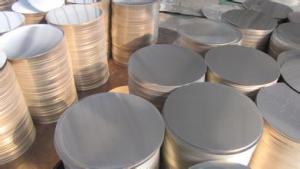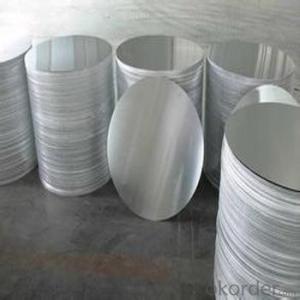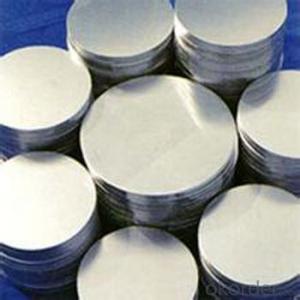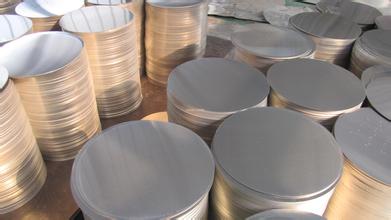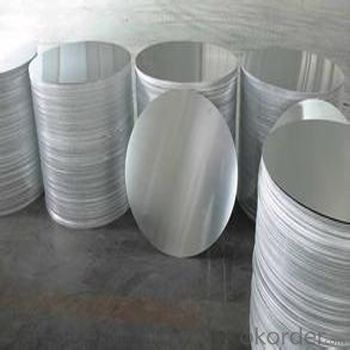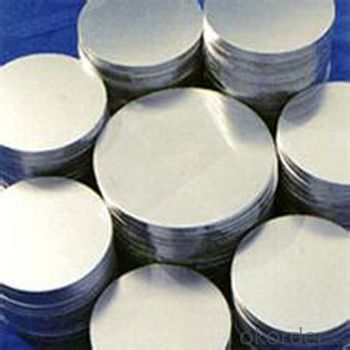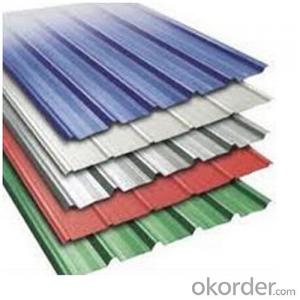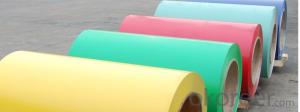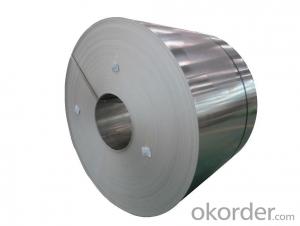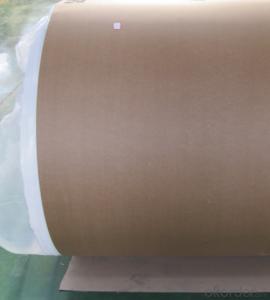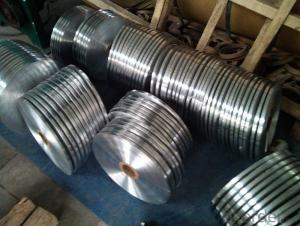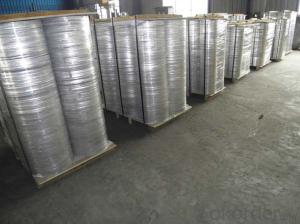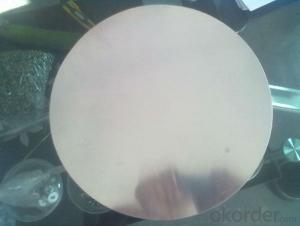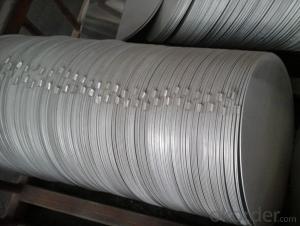Nordc Ware Aluminum Baking Sheets - Circles, Plates, and Pans
- Loading Port:
- Tianjin
- Payment Terms:
- TT OR LC
- Min Order Qty:
- 10 m.t.
- Supply Capability:
- 300 m.t./month
OKorder Service Pledge
OKorder Financial Service
You Might Also Like
Specification
1.Description
Aluminium foil (or aluminum foil) is aluminium prepared in thin metal leaves with a thickness less than 0.2 millimetres (8 mils); thinner gauges down to 6 micrometres (0.24 mils) are also commonly used.In the United States, foils are commonly gauged in thousandths of an inch or mils. Standard household foil is typically 0.016 mm (0.63 mils) thick, and heavy duty household foil is typically 0.024 mm (0.94 mils). Thefoil is pliable, and can be readily bent or wrapped around objects. Thin foils are fragile and are sometimeslaminated to other materials such as plastics or paper to make them more useful. Aluminium foil supplantedtin foil in the mid 20th century.
2.Specification
ALLOY:AA1***(AA1050,AA1070,AA1100etc)
AA3***(AA3003 etc)
TEMPER:O,H14
THICKNESS:0.5mm-4mm
DIAGONAL:100mm-1200mm
STANDARD:GB/T 3880-2006
Special specification is available on customer's requirement
3.Other requirement
SURFACE QUALITY: GOOD APPEARANCE WITH NO-CRACK AND WELL-DISTRIBUTE GRAIN.
BUILD UP: TIGHT SLIT EDGES FREE FROM CRACKS, LAYER TO LAYER SHIFT NOT MORE THAN 2MM.
PROFILE: -0/+1%
FLATNESS: MILL FLATNESS COIL HAVING EDGE WAVINESS RATHER THAN CENTER BUCKLES SHALL BE ACCEPTABLE.
ROLLING PERFORMANCE: RE-ROLLABLE TO THE FINAL DESIRES GAUGES
4.Picture
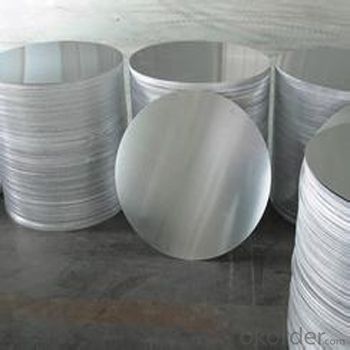
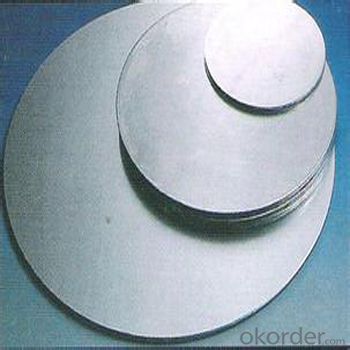
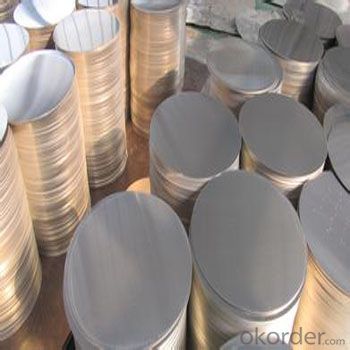
5.FAQ
①How about your company?
A world class manufacturer & supplier of castings forging in carbon steel and alloy steel,is one of the large-scale professional investment casting production bases in China,consisting of both casting foundry forging and machining factory. Annually more than 8000 tons Precision casting and forging parts are exported to markets in Europe
,America and Japan. OEM casting and forging service available according to customer’s requirements.
②How to guarantee the quality of the products?
We have established the international advanced quality management system,every link from raw material to final product we have strict quality test;We resolutely put an end to unqualified products flowing into the market. At the same time, we will provide necessary follow-up service assurance.
- Q: This question asks for methods to prevent rusting on aluminum sheets during the installation process.
- <p>To prevent rusting on aluminum sheets during installation, ensure that the aluminum is of high quality and free from impurities. Keep the surface clean and dry at all times, avoiding contact with corrosive materials. Use appropriate protective coatings or sealants that are compatible with aluminum. Avoid scratches or dents that can expose the metal to moisture. Store aluminum sheets in a dry place before installation. During installation, handle the sheets carefully to avoid damage. Regularly inspect and maintain the aluminum sheets to catch any signs of corrosion early.</p>
- Q: Can aluminum sheets be used for decorative or architectural purposes?
- Aluminum sheets have multiple uses in decoration and architecture. This versatile material can be easily shaped and molded into various forms, making it perfect for a wide range of architectural projects. It is commonly utilized in exterior cladding, roofing, window frames, and facades, lending a sleek and contemporary appearance to buildings. Moreover, aluminum sheets are also employed for decorative purposes like wall panels, art installations, signage, and furniture. Architects and designers often choose aluminum due to its lightweight and durable properties, enabling them to create visually appealing and functional structures. Additionally, aluminum's resistance to corrosion makes it suitable for both indoor and outdoor applications.
- Q: What the glue of L solidified aluminum and fast acrylic plate, solid glue?
- Aluminum and acrylic adhesive, if you want to achieve high strength without any effect, can be bonded with KD-5603 trace glue, but this should be with the help of UV curing light curing, if there is no UV curing light, the sun is strong weather, stick in the sun after 30 minutes can be the bonding effect of glass panel; the specific effects can refer to the general glass coffee table with four Aluminum Alloy column, don't see any traces of adhesive;If you only need sticky sticks and low marks, you can choose N-906AB glue or KD-855 quick drying metal glue
- Q: Are aluminum sheets suitable for food packaging?
- Yes, aluminum sheets are suitable for food packaging. Aluminum is a highly versatile and widely used material in the food industry due to its unique properties. It is lightweight, flexible, and has excellent barrier properties that protect the contents from external factors such as moisture, light, and oxygen. These properties help to maintain the freshness and quality of food products. Additionally, aluminum is resistant to corrosion and does not react with acidic or alkaline substances, ensuring that the taste and quality of the food is preserved. Furthermore, aluminum sheets can be easily shaped into different forms, making them ideal for various types of food packaging such as trays, containers, and foil wraps. Overall, aluminum sheets are a safe and effective choice for food packaging, providing durability, protection, and convenience.
- Q: Can aluminum sheet be used for automotive body-in-white applications?
- Yes, aluminum sheet can be used for automotive body-in-white applications. Aluminum is lightweight, yet strong and durable, making it an ideal material for automotive applications. It offers a high strength-to-weight ratio, which helps improve fuel efficiency and overall vehicle performance. Additionally, aluminum's corrosion resistance properties make it suitable for withstanding harsh environmental conditions. Its formability allows for complex and intricate designs, enabling manufacturers to create lightweight yet rigid automotive structures. The use of aluminum in automotive body-in-white applications has become increasingly popular in recent years, as it helps reduce vehicle weight and emissions while maximizing safety and performance.
- Q: What is the classification of 6061106070 aluminum plate, which respectively represent what it means to ask God for help
- 6061, 1060, 7075, these we call "aluminum plate" brand, six beginning, we usually call six Department of aluminum, the beginning of a department of aluminum is pure aluminum, there are 1050, 1060, 1100, etc., aluminum content is more than 99%. Two at the beginning of the Al Cu alloy, 2024 and 2017, less domestic, belongs to aviation aluminum, in addition to the seven lines is the two most hard.
- Q: What are the properties of anodized aluminum sheets?
- Anodized aluminum sheets are highly desirable for a variety of applications due to their distinct properties. Firstly, they possess a protective oxide layer on their surface, which enhances their resistance to corrosion. This layer is formed through an electrochemical process called anodization, wherein the aluminum sheet is treated with an electric current in an acid electrolyte solution. Consequently, anodized aluminum sheets become more durable and capable of withstanding harsh environments, making them suitable for outdoor use. Another notable property of anodized aluminum sheets is their improved scratch resistance. Through the anodization process, not only is a protective layer created, but the surface of the aluminum also becomes hardened, rendering it more resistant to scratches and wear. This property proves particularly advantageous in applications where frequent handling or abrasive conditions are involved. Moreover, anodized aluminum sheets can be manufactured in a wide range of colors. The anodization process enables the integration of dyes or pigments into the oxide layer, resulting in an array of vibrant color options. This aspect makes anodized aluminum sheets highly popular in architectural and decorative applications, as they can be customized to meet specific design requirements. Additionally, anodized aluminum sheets possess excellent thermal and electrical conductivity. The process of anodization does not significantly impact these inherent properties of aluminum. Consequently, anodized aluminum sheets can efficiently dissipate heat and conduct electricity, making them well-suited for applications such as heat sinks, electronic enclosures, and electrical components. To sum up, anodized aluminum sheets possess enhanced corrosion resistance, improved scratch resistance, a wide range of color options, and excellent thermal and electrical conductivity. These properties render anodized aluminum sheets a versatile and durable material for various industries and applications.
- Q: Are aluminum sheets suitable for structural applications?
- Yes, aluminum sheets are suitable for structural applications. Aluminum is a lightweight and strong material, making it ideal for use in various structural applications. It has a high strength-to-weight ratio, which means that it can provide significant strength while keeping the overall weight of the structure low. This characteristic makes aluminum sheets particularly suitable for applications where weight is a critical factor, such as in aerospace, automotive, and marine industries. Additionally, aluminum sheets offer excellent corrosion resistance, which is important for structures that are exposed to harsh environmental conditions or moisture. They are also highly durable and have good thermal and electrical conductivity. These properties make aluminum sheets suitable for a wide range of structural applications, including building facades, roofing, curtain walls, bridges, shipbuilding, and electrical enclosures. Moreover, aluminum sheets are easy to work with, as they can be easily cut, formed, and welded. This flexibility in fabrication allows for the creation of complex and customized structural components. Aluminum also has a natural oxide layer that provides protection against corrosion, reducing the need for additional coatings or treatments. However, it is important to consider the specific requirements and loads of each structural application before choosing aluminum sheets. While aluminum is strong, it may not be suitable for heavy-load-bearing applications where steel or other materials may be more appropriate. Proper engineering and design considerations should be taken to ensure the structural integrity and safety of the application.
- Q: What are the different bending techniques for aluminum sheets?
- There are several bending techniques for aluminum sheets, including air bending, bottom bending, coining, and wipe bending.
- Q: Are aluminum sheets suitable for storage tanks?
- Yes, aluminum sheets can be suitable for storage tanks depending on the specific requirements and purpose of the tank. Aluminum is a lightweight and corrosion-resistant material, making it an excellent choice for various storage applications. It offers good structural integrity and durability, with the ability to withstand harsh environments and weather conditions. Additionally, aluminum has a high strength-to-weight ratio, which means it can handle heavy loads while remaining relatively lightweight. However, it is important to consider the contents of the storage tank and consult with experts to ensure that aluminum is the appropriate material choice for the specific storage requirements.
Send your message to us
Nordc Ware Aluminum Baking Sheets - Circles, Plates, and Pans
- Loading Port:
- Tianjin
- Payment Terms:
- TT OR LC
- Min Order Qty:
- 10 m.t.
- Supply Capability:
- 300 m.t./month
OKorder Service Pledge
OKorder Financial Service
Similar products
Hot products
Hot Searches
Related keywords
